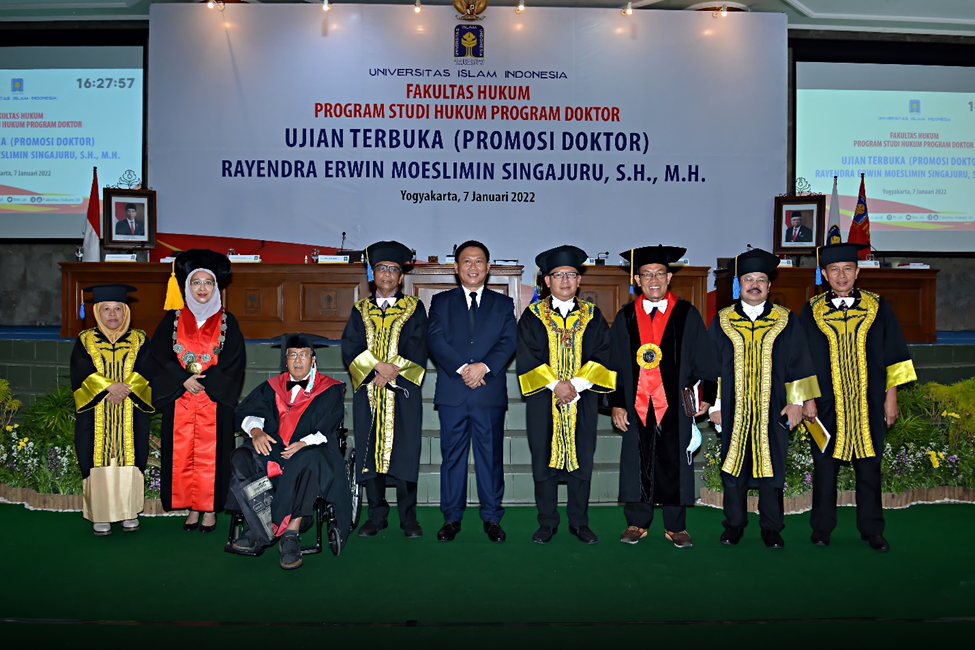Erwin Moeslimin Doctoral Promotion Open Examination Session attended by 4 State Officials

KALIURANG (UII News) – The dissertation entitled “Election Dispute Resolution Legal Politics: Initiating the Establishment of an Election Court in Indonesia” succeeded in leading Rayendra Erwin Moeslimin Singaruju, SH, MH, to defend his dissertation by earning a Doctoral Program in Law Faculty of Law Universitas Islam Indonesia.
The open examination was also attended by 2 Heads of State High Institutions, namely the head of Supreme Court (MA) RI Prof. Dr. H. M. Syarifuddin, S.H., M.H, and the Chairman of the Indonesian Supreme Audit Agency (BPK) Dr. Agung Firman Sampurna, CSFA., CFrA., CGCAE., QGIA. As well as 2 Ministers, namely the Coordinating Minister for Political, Legal, and Security Affairs, Prof. Dr. H. Mohammad Mahfud Mahmodin, S.H., S.U., M.I.P who also appeared as one of the examiners and the Indonesian Minister of Home Affairs (Mendagri) General Police (Purn.) Prof. Drs. H. Muhammad Tito Karnavian, M.A., Ph.D.
The Doctoral Promotion Examination was held on Friday, 4 Jumadil Akhirah 1443 H/7 January 2022 at the Prof. Auditorium. Dr. KH. Kahar Muzakkir. Erwin explained his dissertation on the Election Court in front of the examiners. Namely. Besides Prof. Mahfud MD, the examiner for this doctoral promotion is Prof. Fathul Wahid Ph.D, Rector UII, Prof. Dr. Ni’matul Huda SH MH (Promoter), Prof. Jawahir Thantowi, P.hD (Co-Promoter), Prof. Dr. Mahfud MD (Examiner), Prof. Amzulian Rifai, P.hD (Examiner), Pro. Dr. Muhammad Fauzan (Examiner), Prof. Dr. I Gusti Ayu Ketut Rachmi Handayani SH,. MH (Examiner) and Dr. Suparman Marzuki SH MSi was also the examiner.
Furthermore, the dissertation entitled “Legal Politics of Electoral Dispute Resolution: Initiating the Establishment of an Electoral Court in Indonesia” seeks to answer the problem of resolving electoral disputes in Indonesia and the ideal election court in the future. In his presentation, Erwin emphasized that the research results showed that the legal politics of election dispute resolution so far has not been strongly and stable institutionalized in one institution.
“Two judicial power institutions, namely the Supreme Court and the Constitutional Court with different character and constitutional mandates, have alternated as places for resolving election disputes, he said. He again explained that the different procedures and decisions of the two often contradict each other and create legal uncertainty and ultimately do not give a sense of justice. Therefore, according to Erwin, in the future an election court institution is needed with a special mandate to adjudicate election disputes which are formed based on the orders of the Election Law, so that there is legal consistency, legal certainty and fairness in the resolution of election disputes,” said Erwin, who is also a former member of the DPR RI.







